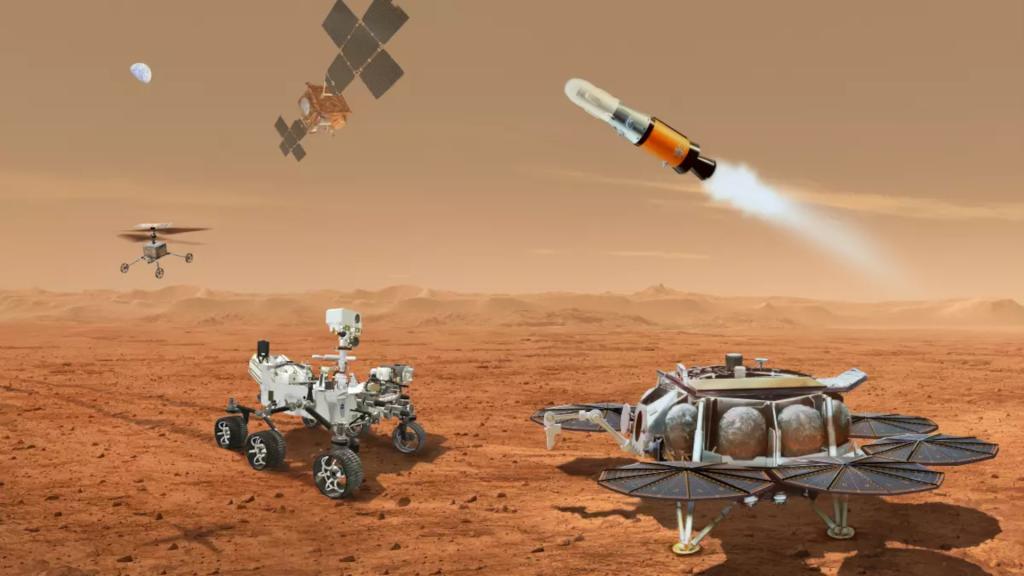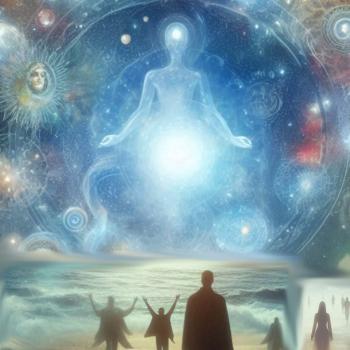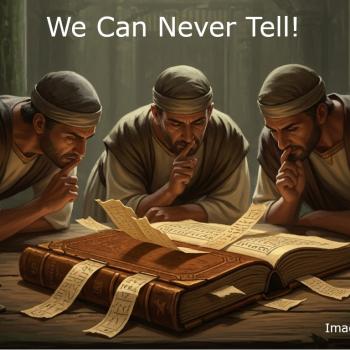What would we give up to save our socks?
A parable of Mars
In 2065, a group of business people decide to terraform Mars to exploit its resources and make it habitable. The plan was good. They would plant foliage that turned the 95% carbon dioxide in the atmosphere into oxygen that people could breathe. They would pump water from deep within the planet for people’s water needs and create lakes for food and recreation. Various animal species would also be brought there, not for eating but for a zoo.

Didn’t go as planned
No governments regulated the use of Mars, although cooperative agreements had gone into effect. Corporations had already mined rare minerals from comets and established several minor operations on Mars. The business community saw major opportunity.
In usual business fashion, people saw terraforming and creating colonies and lakes as ways to draw people to Mars to work. Keep workers happy and you had them. That soon turned into, “I owe my soul to the company store.” Business is always under pressure to keep costs low to maximize profits. Most people who went to Mars could only go back to Earth after ten years, and if they owed money on Mars, they had to go back to the red planet. Most did.
Terraforming was soon limited to colony atmospheres, not the entire planet. The zoo turned into people having one pet. Water was restricted to colony swimming pools and mining operations.
Wealth soon raised its entitled head in creating magnificent colonies that were off limits to others on the planet. Many advantages went to business heads, wealthy visitors, and people who created their own colonies using these new terraform technologies. They could go back and forth to Earth and the Moon whenever they wanted.
Investors became unhappy with the return they were getting on their investment. They wanted profits on their stock between 30 to 40% annually. At ten percent, they would throw in the towel and close their operations for not enough profit. This meant cutting wages even though most knew you can’t save your way to prosperity. But those on Earth could not afford to pay more because of recession after recession.
Promises to keep Mars pristine went out the window. Not that mining operations had ever disposed of their scrap as they promised, nor did they reclaim the land. Scrap heaps grew next to colonies. No further terraforming was done.
People suffered. All their wages went into buying necessities. Food became rationed. Imports of goods from Earth dwindled. Medical care became rationed, first going to the wealthy and business officers, and others got minimal care. This is reminiscent of the movie Total Recall, But it’s realistic.
And so people realized, as on Earth, so goes Mars.
What should we do with the Earth?
The Bible has passages to think about:
The allegories in the Book of Genesis tell us we have some control over the environment:
“Then God said, “Let Us make man in Our image, according to Our likeness; and let them rule over the fish of the sea and over the birds of the sky and over the cattle and over all the earth, and over every creeping thing that creeps on the earth.” God created man in His own image, in the image of God He created him; male and female He created them. God blessed them; and God said to them, “Be fruitful and multiply, and fill the earth, and subdue it; and rule over the fish of the sea and over the birds of the sky and over every living thing that [am]moves on the earth.” Then God said, “Behold, I have given you every plant yielding seed that is on the [an]surface of all the earth, and every tree which has fruit yielding seed; it shall be food for you; and to every beast of the earth and to every bird of the sky and to every thing that moves on the earth which has life, I have given every green plant for food”; and it was so.” Genesis 1: 26-30 (NASB)
“Then the Lord God took the man and put him into the garden of Eden to cultivate it and keep it.” – Genesis 2:15 (NASB)
How do we treat the things that belong to God?
“For by Him all things were created, both in the heavens and on earth, visible and invisible, whether thrones or dominions or rulers or authorities—all things have been created through Him and for Him. He is before all things, and in Him all things hold together.” – Colossians 1:16-17 (NASB)
The question for us is, are we good stewards of what we’ve been given, or do we see the Earth as something to take from without limits and regard for consequences? Is plundering the Earth simply a way to make money without regard for the effects?
“Do not be deceived, God is not mocked; for whatever a man sows, this he will also reap.” -Galations 6:7 (NASB)
State of the Onion
I used to write a series, State of the Onion. It was about unwrapping the layers of our civilization to see how we were doing on various issues, like economics, gun violence, and the environment. I asked questions like, “Do we show love for others by helping them to support themselves through economic or social measures? Or is it every person for themselves?” We’ve actually made some progress. But, alas, there is a huge amount of work to do.
Gun violence
Can we uncover the root causes of the daily occurrence of over two mass shootings of four or more people in the US and seek solutions to put an end to the terrorism and trauma in our society?
The environment
“Houston, we have a problem,” to quote US astronauts on a moon mission. An oxygen tank had ruptured, affecting the spacecraft’s water and electricity supply. Against extreme difficulties, scientists worked and hurriedly found ways to compensate for the problem and got them back to Earth safely. They used their socks to make a filter. Amazingly, where there’s a will there’s a way. Will we give up our sox to save the environment?
Where is the will? For the environment, fossil fuels are the biggest culprit in driving climate change much faster than at any point in the Earth’s history, and we would rather drown in gasoline. As a result, we suffer endless drought destroying the Western half of the US and Canada. Fires rage across the West. Storms in Central America wipe out agriculture and people’s ability to make a living, and we turn them away at our border.
Severe weather and floods sweep away our homes and cars, and double insurance rates. Rising seas and hurricanes threaten our shorelines.
We passively sit by, believing the problem is too big. We’re unwilling to make financial sacrifices, and avoid getting any education that would help us know how to understand or solve the problem.
It’s better in our minds to let the planet reach the warming and CO2 tipping point from which it can’t recover, and hand an uninhabitable planet to our children and grandkids, saying, “We preferred dining on oil to saving you. We won’t sacrifice our socks.”
If we paid as much attention to global warming as saving the astronauts on a moon mission, we would be a long way into stopping global warming, and a lot safer in our environment. In fact, President Kennedy declared the moon mission on September 12, 1962. Neil Armstrong landed on the moon in July 1969. It took us seven years to do the impossible, and to save the astronauts a few hours or days. We can do what we set our minds to.
What three degrees of global warming looks like. TED Talk.
The Tipping Points of Climate Change — and Where We Stand. TED Talk.
Can We Cool the Planet? | Full Documentary I NOVA | PBS
Drawdown Solutions Library. Project Drawdown’s world-class network of scientists, researchers, and fellows has characterized a set of 93 technologies and practices that together can dramatically reduce concentrations of greenhouse gases in the atmosphere.
The Economy
Many people can no longer afford to live in major cities. They put up tents on sidewalks so they can still do their jobs. Some get terminated from jobs, so they and their families become homeless and many of those live on the streets. Housing has become unaffordable because of the competition for housing from families and investors, and many other reasons.
The US representative government has transformed from a democracy to an oligarchy over time. It stopped being capitalist many decades ago, but most people don’t know that. In an oligarchy, the wealthy control the government. They do it through influence. Money is one major influence. All congressional representatives are millionaires after a short time in office.
If you want someone elected who represents you, fund their campaign and keep giving them money while they’re in office. They will keep voting for your interests. And keep them informed of stock that’s failing so they can get out quick (insider trading).
None of this is illegal for politicians. It should be because it amounts to influence, and it’s not the rules we citizens play by. A bill to stop this has been sitting in committee since 2022. It’s doubtful that it will ever get voted on in Congress.
The US supports the wealthy and investors through legislation that protects them. Congressional representatives protect themselves by never making themselves subject to the rules we citizens have to play by, and only they make the laws.
How do the wealthy get wealthier? All money rises to the top. The economy is predominantly driven by two things: consumer spending and investor pressure on companies to increase stock prices.
This pressure forced companies to prioritize short-term gains and neglect critical long-term planning, which damaged them. So, several CEOs of major companies sent an open letter to investors to stop. One letter from the Blackrock investment firm, from calls for less quarterly guidance, which is the wrecking ball of business planning.
Another letter from CEOs of the Business Roundtable asks business and investors to change their priorities: “Americans deserve an economy that allows each person to succeed through hard work and creativity and to lead a life of meaning and dignity.” But greed knows no bounds.
Companies live under the threat that quarterly earnings downfalls will drive away investors.
Economic greed transfers wealth from the lower and middle financial classes by raising prices to the wealthy class through inflating stock prices with consumer price driven revenue.
Do the wealthy spend this money? No, their spending remains constant. They reinvested the stock revenue back into more stock. It never helps the economy in any way. The stock market is just a mechanism for generating wealth.
If we want the economy to function for everyone who works, then we need to limit investor overreach and put investor money back into the economy. This can be done through very minor worldwide taxes on trades. We can do this by implementing worldwide taxes on excess investor profits instead of waiting until investment funds are withdrawn. We can do this by implementing excess profit caps that restrict the increase in stock prices. Numerous strategies can accomplish this, ultimately benefiting individuals in our economy and further enriching investors by encouraging increased spending.
Get involved:
Look up Capitalism 2.0 to see better ways of doing things.
Institute for New Economic Thinking.
Future of Work Initiative. Aspen Institute.
Center for the New Economy and Society.
Preparing For The Future Of Work, Education, Economy, By: Dorian Scott Cole.
Conclusion
How are we doing?
It depends entirely on who we are. Newer generations, such as Z and X (late Millennials), are ready to solve the problems. They are activists on these issues.
Older generations and government representatives are more likely to align with the status quo, big oil, big wealth, and big guns. We’re mostly okay with mass shootings in schools and other places, communities terrorized by gun violence, the west becoming infertile and burning, the planet overheating to destroy civilization, and people living in tents on the street. We tend to let concern and responsibility roll off our backs like water off a duck. An influential majority seem to have no concern for others’ wellbeing or future generations.
So, are we doomed? I have a lot of confidence in new generations to courageously stand up and fix the major problems we ignore because of inconvenience and money. Thankfully they are our future, not us.
_________________________________
My friend, David Ketcherside, former Christian broadcaster, has written a book series that I gave feedback on. It’s for men, written from his experience, thoughtful analysis, and heart. Gen Z and X would find it very helpful. It’s available in print, on Kindle, and as an audiobook on Audible. Check out The Whole Dude. His description: “My hope is to remind readers what being whole looks like, and help them recognize the distortions that stop us from feeling totally awesome all the time.” He’s also excellent at marketing if you have marketing needs.
Probability Space
What probability spaces can we open in our minds to limit presidential powers to existing law, except in cases of national crisis that Congress would agree at 60% is a crisis?
Potential Space
If you think creatively and allow your mind to wander and explore the national divide, how can we find consensus on divisive issues?
________________________
– Dorian
Our answer is God. God’s answer is us. Together we make the world better.
Restore and recreate. Take time to celebrate life. Laugh, sing, and dance regularly, even every day. Happy. This is why we dance to celebrate life: Reindeer actually running and dancing.
Bible scripture verses are New American Standard Version (NASB), unless noted.
Author and books
Appease the Volcano: What does God require from people? The voices of the ancients from many religions echo much of the same things: It starts with law, then mercy and forgiveness, then love.
The Prophetic Pattern: Ancient and Modern Prophecy: How to distinguish the intent of various types of prophecies and oracles, both ancient and modern.
Preparing For the Future Of Work and Education: Analysis of the kinds of jobs that AI and Robotics will displace, and the educational requirements for them. AI will replace or augment thirty percent of jobs. This is an in-depth analysis citing many authoritative sources.
Author Website: Dorian Scott Cole












